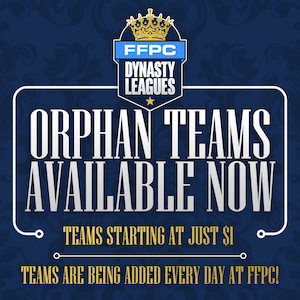Is your fantasy football league in chaos from postponed NFL games? Cliff provides tips to help fantasy managers and commissioners deal with COVID-19 issues in 2020.
Out, out, out, in, in, in, in, in, in, out, in, out, in, in, out, in, out, out, out, in, in.
That’s not me working as a bouncer for the pretend nightclub I started in my house (it’s me and my wife and my two dogs, no Darren Waller fundraiser situation here,) it’s me seeing how many of the Rotoballer Top 20 have missed time, barely four weeks into the season.
It’s worth noting that by no stretch of the imagination is this unexpected, but for a pastime that most of us specifically leaned into because it was something to do mid-COVID-19 (more so than usual) some of our leagues didn’t spend September toiling away at the lengthy rules that were needed to ensure that games could function week-in and week-out.
Featured Promo: Looking for some more fantasy football action? Adopt a dynasty orphan team over at FFPC. Sign up today and get $25 off any FFPC league. Sign Up Now!
Changing the Rules
Many of us haven’t had to set a roster with a Tuesday night football game involved when the 2010 Eagles and Vikings were forced to postpone their game due to a snowstorm (if you’d like to win bar trivia, that was Andy Reid’s Eagles team, which would’ve put him in the useless statistics library if the Chiefs-Patriots game had to be pushed to Tuesday.) Many of us wouldn’t have assumed an IR of 10 players was a good idea for the whole league. While some of our leagues maybe did away with buy-ins or other facets to make the complicated game slightly more simple in 2020, a much larger portion of you did not.
Sportrac has 224 players on IR as I write this, plus 67 opt-outs in the pre-season. This doesn’t cover the players who are on a single game Out designation, of which there are 62 on offense as of my writing this on 10/5. There are bad years, and then there is 2020.
The NFL is a bit of a moving target as far as rules and regulations for COVID-19; while it originally hoped daily testing and contained travel would help ensure games could be played safely and normally, the league has also dished out hundreds of thousands of dollars in fines before even a hundred total games have been played. It announced Monday that regulations would be updated, which serves as a nice reminder; the league didn’t quite know how this would shake out.
The NFL updating its own rules serves as an important reminder to everyone in your league; it’s not too late to update some of your own. For some of you, you’ve already done this. For others, especially the ones frustrated over how your teams have been affected while your leagues have ultimately stayed silent, this is something you can forward over to your commissioner to review.
One last note: none of these rules require a change that should affect anyone’s roster. We won’t recommend you switch to team QBs like an XFL fantasy league or switch the scoring to best ball, as those changes wouldn’t affect all teams equally. Too much season has already occurred, now it’s more about making it sustainable the rest of the way.
Ground Rules
Any new league rule that is proposed and adopted should abide by the following three principles:
- The rule has to provide relief for poorly affected teams while also providing an opportunity for less affected teams, without straying too far in either direction
- The rule has to be unanimously approved, or at least majority+1 (seven of the 10 in a 10-player league, though I always hope the commissioner lets the league decide and stays out of it); if we’re not largely on board, then let’s not do it
- Is the juice worth the squeeze, or will instituting this rule cause more of a headache to everyone than it will provide a solution? The goal is to ensure that the league is fun, fair, and competitive. A hundred rules to try to provide total fairness to an already weird year isn’t a solution, it’s just some temporary safeguards that may have some unintended consequences.
I would also say that rules are more necessary if there is a financial implication, or even a winner/loser punishment system, for the league. Leagues that didn’t have a buy-in or prize this year may find that rolling the dice week to week makes more sense. On the other hand, if you’ve paid quite a bit of money for a down year, I’d almost certainly insist that some rules be added so that I didn’t simply forfeit my investment.
Everything on my list follows these three rules, and while it may evoke some commissioner eye-rolling, it’s a good start that most of the league can agree upon!
Designated Players
If a game is being threatened with a COVID-19 related postponement, one of the easiest things you can do is mark a designated player for each of your starters whose games are being threatened with a new start date. Whether it’s a “wait and see” approach like the Patriots and Chiefs ended up taking, or rescheduling for a future contest like the Titans and the Steelers, more games will end up being threatened this year in a similar matter. Your ground rules should be as follows
- If a legitimate reporting sports organization (ESPN and Adam Schefter, the NFL or NFL PR, Fox Sports, or another outfit that has reporters who communicate directly with the league off) reports that a game risks being postponed the day before a kickoff, swap in the temporary starter and bench the designated player. The designated player is the starter you’d prefer to start whose game is being threatened.
- Text or email your commissioner and their opponent to let them know which of their starters are being substituted for a designated player. This must be done the day before the game, and cutoff times can be decided by the league.
- If the game that was set to be postponed is actually played, the commissioner swaps in the designated player. If the game is not played, the lineup is not adjusted.
This means that you have a safeguard in place for the games whether they occur or not, and you win or lose based on a full lineup, not a last-second cancellation.
Additional IR or Bench Spots
With the statistics I highlighted above regarding league-wide injury statistics, there’s a high probability that each team in your league has enough major injuries to warrant consideration of more IR spots. For affected teams, it’s a necessity. Keeping a healthier roster, having the room to acquire backups or upside guys, means that they’ll be competitive even if they’re less so. For teams not affected, especially when it comes to keeper leagues, the upside is obvious; you get more places to stash the guys who you can keep next year.
Not interested in IR specific roster spots? Why not open up the bench and let guys go deeper. This is even more of a boon for the team managers who don’t have a lot of IR guys, though it may require a way to do a mini-draft to fill the five or six bench spots more fairly (though waiver chaos has its obvious benefits)
It’s arguably one of the most controversial new rules on this list, but if your bench is small and BYE weeks are arriving, is it really worth winning because teams had to drop their short-term IR studs just to roster a whole team? I have no interest in winning a matchup because a guy felt the need to drop Christian McCaffrey to temporarily roster Justin Jackson.
Best Projected Substitutes
If a game is canceled on the day-of and the “designated player” option isn’t doable, you can institute a sweeping rule that allows for any day of replacements, even if games have already started, for the highest projected player. For lack of a better term, I call it the “Best Projected Substitute”
The rule is simple; if the league votes to institute this rule, and a game is canceled on the day-of, any affected players are automatically replaced with the highest projected player in that position on the bench. Team managers are allowed to add drop or adjust their lineup as they see fit without commissioner intervention, but it is a stopgap for teams that may not be able to adjust in time to institute a replacement, or their best available replacement is locked.
This is one of the trickier rules, as your league may find that you want this rule to only be in place once Sunday games start. But the most careful clarification is regarding locked players and projections; the commissioner is only allowed to substitute in the player with the highest projection, regardless of the actual score. This may mean a player has already played on Thursday and gets added to a lineup, or it could regard a player with a questionable designation on Monday. You’ll want to be clear here because solving one problem could mean more are added, so it’s best to get this rule exact before it becomes necessary.
Download Our Free News & Alerts Mobile App
Like what you see? Download our updated fantasy football app for iPhone and Android with 24x7 player news, injury alerts, rankings, starts/sits & more. All free!






 RADIO
RADIO

























